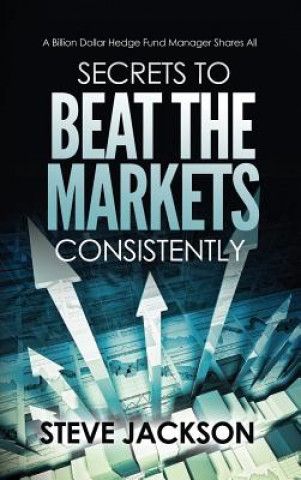
Kod: 16347402
Secrets to Beat the Markets Consistently
Autor Steve Jackson
By some estimates, quantitative or algorithmic trading now accounts for over one-third of the trading volume in the United States. There are, of course, innumerable books on the advanced mathematics and strategies utilized by inst ... więcej
- Język:
 Angielski
Angielski - Oprawa: Twarda
- Liczba stron: 196
Wydawca: Worldwide Funding Corp, 2017
- Więcej informacji o książce

Zobacz książki o podobnej tematyce
-

Dune
34.73 zł -33 % -

Haunting Adeline
125.38 zł -1 % -

Berserk Deluxe Volume 2
211.92 zł -1 % -

White Nights
15.25 zł -23 % -

Powerless
48.58 zł -11 % -

Atomic Habits
57.31 zł -28 % -

Dune Messiah
46.17 zł -3 % -

Berserk Deluxe Volume 3
217.44 zł -3 % -

One Day
32.52 zł -36 % -

Berserk Deluxe Volume 1
211.12 zł -2 % -

Iron Flame
60.93 zł -28 % -

Surrounded by Idiots
36.63 zł -28 % -

Harry Potter and the Prisoner of Azkaban (Minalima Edition)
169.86 zł -2 % -

Gravity Falls Journal 3
89.14 zł -

Heaven Official's Blessing: Tian Guan Ci Fu (Novel) Vol. 1
85.32 zł -5 % -

The Creative Act
99.88 zł -15 % -

Dune
47.18 zł -23 % -

Hunting Adeline
126.08 zł -4 % -

A Little Life
46.87 zł -14 % -

Children of Dune
46.57 zł -2 % -

Heaven Official's Blessing: Tian Guan Ci Fu (Novel) Vol. 2
77.49 zł -14 %
Powiadomienie o dostępności
Wpisz swój adres e-mail, aby otrzymać od nas powiadomienie,
gdy książka będzie dostępna. Proste, prawda?
Więcej informacji o Secrets to Beat the Markets Consistently
 Opis
Opis
By some estimates, quantitative or algorithmic trading now accounts for over one-third of the trading volume in the United States. There are, of course, innumerable books on the advanced mathematics and strategies utilized by institutional traders in this arena. However, can an independent, retail trader benefit from these algorithms? Can an individual with limited resources and computing power backtest and execute their strategies over thousands of stocks, and come to challenge the powerful industry participants in their own game? I will show you how this can, in fact, be achieved. WHO IS THIS BOOK FOR? I wrote this book with two types of readers in mind: 1. Aspiring independent ("retail") traders who are looking to start a quantitative trading business. 2. Students of finance or other technical disciplines (at the undergraduate or MBA level) who aspire to become quantitative traders and portfolio managers at major institutions. Can these two very different groups of readers benefit from the same set of knowledge and skills? Is there anything common between managing a $100 million portfolio and managing a $100,000 portfolio? My contention is that it is much more logical and sensible for someone to become a profitable $100,000 trader before becoming a profitable $100 million trader. This can be shown to be true on many fronts. Many legendary quantitative hedge fund managers such as Dr. Edward Thorp of the former Princeton-Newport Partners (Poundstone, 2005) and Dr. Jim Simons of Renaissance Technologies Corp. (Lux, 2000) started their careers trading their own money. They did not begin as portfolio managers for investment banks and hedge funds before starting their own fund management business. Of course, there are also plenty of counterexamples, but clearly this is a possible route to riches as well as intellectual accomplishment, and for someone with an entrepreneurial bent, a preferred route. Even if your goal is to become an institutional trader, it is still worthwhile to start your own trading business as a first step. Physicists and mathematicians are now swarming Wall Street. Few people on the Street are impressed by a mere PhD from a prestigious university anymore. What is the surest way to get through the door of the top banks and funds? To show that you have a systematic way to profits-in other words, a track record. Quite apart from serving as a stepping stone to a lucrative career in big institutions, having a profitable track record as an independent trader is an invaluable experience in itself. The experience forces you to focus on simple but profitable strategies, and not get sidetracked by overly theoretical or sophisticated theories. It also forces you to focus on the nitty-gritty of quantitative trading that you won't learn from most books: things such as how to build an order entry system that doesn't cost $10,000 of programming resource. Most importantly, it forces you to focus on risk management-after all, your own personal bankruptcy is a possibility here. Finally, having been an institutional as well as a retail quantitative trader and strategist at different times, I only wish that I had read a similar book before I started my career at a bank-I would have achieved profitability many years sooner. Given these preambles, I won't make any further apologies in the rest of the book in focusing on the entrepreneurial, independent traders and how they can build a quantitative trading business on their own, while hoping that many of the lessons would be useful on their way to institutional money management as well.
 Szczegóły książki
Szczegóły książki
- Pełny tytuł: Secrets to Beat the Markets Consistently
- Podtytuł: A Billion Dollar Hedge Fund Manager Shares All
- Autor: Steve Jackson
- Język:
 Angielski
Angielski - Oprawa: Twarda
- Liczba stron: 196
- EAN: 9780692890394
- ISBN: 0692890394
- ID: 16347402
- Wydawca: Worldwide Funding Corp
- Waga: 431 g
- Wymiary: 229 × 152 × 13 mm
- Data wydania: 09. May 2017
zadowolonych klientów
Od roku 2008 obsłużyliśmy wielu miłośników książek, ale dla nas każdy był tym wyjątkowym.
Copyright! ©2008-24 libristo.pl Wszelkie prawa zastrzeżonePrywatnieCookies



 21 milionów książek
21 milionów książek Dostawa 10.99 zł
Dostawa 10.99 zł (32) 444 93 66 (8-15.30h)
(32) 444 93 66 (8-15.30h)